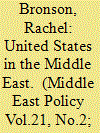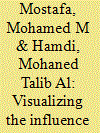| Srl | Item |
| 1 |
ID:
123895


|
|
|
|
|
| Publication |
2013.
|
| Summary/Abstract |
RUSSIA'S CONTRIBUTION in strengthening collective international efforts to combat international terrorism, drug trafficking and organized crime was set by President Vladimir Putin in his May 7, 2012 decree "On the Measures to Implement the Russian Foreign Policy Course" among the country's international policy objectives.
This category of new threats and challenges has become firmly established on the international agenda and is a factor in the provision of global and regional security, and sometimes also an instrument of geopolitical influence.
|
|
|
|
|
|
|
|
|
|
|
|
|
|
|
|
| 2 |
ID:
133621


|
|
|
|
|
| Publication |
2014.
|
| Summary/Abstract |
Recent events in Ukraine have brought America's growing energy independence and its resulting geopolitical influence into sharp relief. Almost immediately after Moscow invaded Crimea, leaders on both sides of the Atlantic began urging Washington to strengthen its allies and weaken Russia's dominance by deepening its energy ties to Europe. In a letter sent to House Speaker John Boehner and Senate Majority Leader Harry Reid, the ambassadors from Poland, Hungry, the Czech Republic and Slovakia called on the United States to strengthen its "gas-to-gas competition" to enhance European energy security.1 President Obama echoed their call: "Energy is obviously a central focus of [American and European] efforts" vis-à-vis Russia.2 The United States has an opportunity to use its newfound energy assets to shape the political chessboard in ways unforeseen just a few years ago.
|
|
|
|
|
|
|
|
|
|
|
|
|
|
|
|
| 3 |
ID:
133582


|
|
|
|
|
| Publication |
2014.
|
| Summary/Abstract |
The aim of this paper is to investigate why some internal conflicts are terminated quickly, while others linger for several decades without a looming resolution in the horizon. In an attempt to achieve this objective, the role played by geopolitical factors in the Arab world's internal conflicts was investigated. More specifically, we used Kohonen self-organizing maps, an artificial intelligence-based neural network technique, along with event duration models to investigate the role played by distance from the capital, access to international borders, terrain, valuable natural resources such as oil, and rebels fighting capability in civil wars in the Arab world. Using recently validated data spanning more than 50 years of Arab civil wars (1948-2003), our findings indicate that previously ignored geopolitical factors seem to play an important role in the duration of internal conflicts in the Arab World.
|
|
|
|
|
|
|
|
|
|
|
|
|
|
|
|